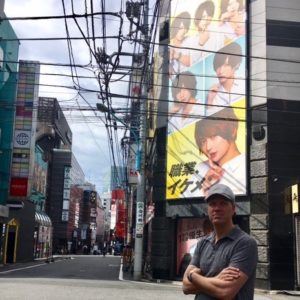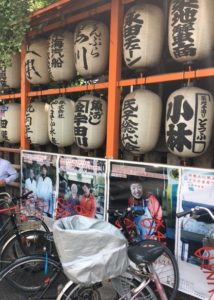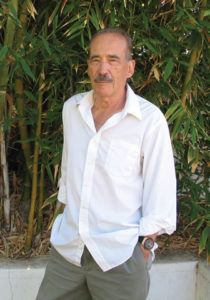On Not Knowing

From the window of our Tokyo hotel, we overlook an economics college on whose balconies and roof deck congregate about a dozen students. A couple of them throw a football; some go off and stand alone on the roof to smoke cigarettes. I haven’t seen a lot of activity at the school today, compared to yesterday; it’s a Friday evening. As I scan the brick facade, in another set of windows I see a man practicing what appears to be agile karate moves. When I look again, the group is making their way down to the fifth level deck. Several in this group run around, in what appears to be an aggressive game of tag. Much good-natured yelling and hooting is going on.
It doesn’t matter that this is Japan. It could be in New York City and I still wouldn’t know what those kids are doing, although I’m culturally closer to understanding the activities of a group of American college students.
I’m writing this near the end of almost two weeks in Japan, and what has struck me about the country is how little I know about what I see around me. As well, how in the dark I am with the language, having picked up some while here. But as this is rudimentary, I struggle to communicate.
A few observations: How are the streets so clean they look like you could eat off them–yet how can there be no trash bins to be found anywhere? Why the high-tech toilets with a control panel that looks like it requires a Ph.D. in rocket science to operate? How come I can’t find any fruit and when I do, it’s outrageously pricey? Why are there only five brands of beer (all Japanese, all lager)? Why is everyone in such a hurry to get where they are going, at any time of the day (even the Metro signs read “Don’t Rush” in English)? In the Tsukiji fish market—a warehouse about the size of three football fields–where will all that fish go? And what is the obsession with baseball, and American jazz, the latter of which is like muzak, it’s everywhere. As are vending machines.

For a Californian who is making his best effort to match the symbols on the map with the ones he sees on the street signs, this is Japan.
The people, I should add, are generally nice, even uncannily respectful. An old man shook my hand when I held the door open for him. Japan is a curiously orderly society. I’m reminded of what first intrigued me when I watched Chris Marker’s 1983 experimental film, Sans Soleil, which is only indirectly about Japan, but contains enough enigmas about the country to pique a writer’s curiosity.
Looking out my hotel window, I feel like Jimmy Stewart in Rear Window. I get that lazy voyeuristic survey, waiting and expecting, or not, to see something, all of which would barely register in my awareness but for the fact that I am curious.
So much of my writing practice is inward looking. To write is to imagine. Usually I write fiction, or I write about what I am reading. I often write on what I’m thinking about. The notes I make for myself are a few steps removed from my attempt to put them into a context where I might utilize them.
I’m much less versed in the task I set for myself in Japan, writing about what is happening around me. As I want to document my trip, I attempt to catch myself in the act of noticing. This could be too obvious, perhaps to the point of self-consciousness. But on the other hand, it is not, because I lose myself in the unfamiliar, the people, their mannerisms, the general conforming of a populace to local customs. Being 5500 miles removed from my usual day to day experience, I am immersed.
There’s not much practical use I have for these observations, unless of course I can apply them to a character, but it’s hard for me to see how I would extract from the general, into the particular. And to know a character, I need particulars. To inhabit an unfamiliar culture means that I can’t really know what motivates people, nor in what I’m going to find. I’m trying to do this without any Western bias of interpretation, yet the process of observation seems to get me no closer to understanding.
This dovetails with a notion I have about the writing process: writing is so generated by unknowable impulses that it cannot help but enfold a mystery. And because of this, the result itself, whether fiction or nonfiction, is often an illustration of the process.

On the other hand, so many writers seem to pay lip service to this notion of not knowing what it is they do—am I making the mistake of trying to demystify the process? I’m only concerned if it takes away the motivation, or places undue expectation on what I will write.
The workings of writing are unconscious. If I know ahead of time what I’m going to write, why should I bother to write it? I let the mechanism work unimpeded. Writing is 99% not knowing what I’m going to write, and 1% knowing only that I’m going to write. The unknown for me—and I’d suspect, for a lot of writers—is in, what will I write?
But to return to the economics college roof deck. I still have no idea what those students are doing. I have seen, and will see, before the trip is out, many more things I have no clue about, and have no basis for understanding. And so I make notes.
I love the inherent mystery of not knowing. Maybe this is what keeps me writing. Maybe I never know, even after I try to convince myself of what I’m writing, what I’m writing about. This is a metaphor for my experience in Japan. It’s also a metaphor for my writing. I remind myself that the more I write, the closer I get.
 On Wednesday June 14th at 7PM, Changing Hands Phoenix will be hosting Paul Brinkley-Rogers as he discusses his new memoir, Please Enjoy Your Happiness. The memoir focuses on his time in 1959 when he had a love affair with an older Japanese woman while serving aboard a US Navy vessel outside of Yokusaka. Paul is a Pulitzer Prize-winning journalist and veteran war correspondent that worked for many years in Asia, covering the war in Vietnam and Camboadia for Newsweek.
On Wednesday June 14th at 7PM, Changing Hands Phoenix will be hosting Paul Brinkley-Rogers as he discusses his new memoir, Please Enjoy Your Happiness. The memoir focuses on his time in 1959 when he had a love affair with an older Japanese woman while serving aboard a US Navy vessel outside of Yokusaka. Paul is a Pulitzer Prize-winning journalist and veteran war correspondent that worked for many years in Asia, covering the war in Vietnam and Camboadia for Newsweek. 

